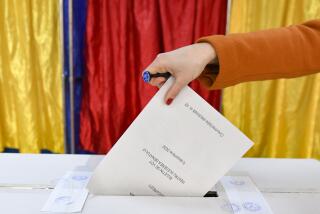West Setting Poor Example With Curbs on Press, Media Group Says
- Share via
LONDON — Western-style democracies, including Britain and the United States, are curbing press freedom and damaging the prospects of countries now striving for greater openness, a world media organization said Tuesday.
The International Press Institute, in its annual “World Press Freedom Review,” said that countries with a strong tradition of press freedom are showing a worrying trend toward government interference. At the same time, it said, the Soviet Union and many developing countries are struggling to sweep away limits.
“The hopes and encouragement of nations which are on their way toward more freedom and who rely on an example from countries with a democratic system . . . must not be crushed by governments in the free world, who should be guardians of press freedom,” it said.
The 32-page report cited “significant improvements” in press freedom in Taiwan and South Korea and setbacks in Chile, Colombia, Malaysia and other nations where journalism continues to be a sometimes dangerous and often difficult profession.
While the Soviet Union’s policy of glasnost , or openness, has meant “heartening strides” toward a more open press, restrictions on the reporting of subjects such as ethnic violence in Armenia have been a “disgrace,” the report said.
The institute, which has offices in London and Zurich, is an independent body representing 2,000 publishers and editors in more than 60 countries. Its report this year detailed developments in 82 countries.
In 1988, the report said, the Reagan Administration “continued its efforts to limit public access to information held by the American government.” It cited as a “blatant example” of interference in the media the U.S. Supreme Court’s upholding of the conviction of a former intelligence analyst for giving satellite photographs of a Soviet ship to a British magazine.
The report also criticized the new Canada-U.S. free trade agreement for restricting Canadian journalists who can work in the United States to those with a university degree and three years’ experience.
In Britain, the press scored a victory when Prime Minister Margaret Thatcher’s government lost its court fight to prevent newspapers from publishing excerpts from “Spycatcher,” the memoirs of former intelligence agent Peter Wright, the report said.
However, the report criticized Britain’s ban on all radio and television interviews with 11 groups in Northern Ireland, including the outlawed Irish Republican Army and its political wing, Sinn Fein. The report called the ban “the most drastic action taken against British broadcasters in peacetime.”
More to Read
Sign up for Essential California
The most important California stories and recommendations in your inbox every morning.
You may occasionally receive promotional content from the Los Angeles Times.










